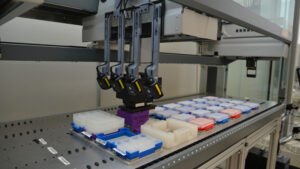According to the US Department of Agriculture, American farmers in 2021 harvested nearly 2.5 million acres of long- and medium-grain rice, averaging 7,709 pounds/acre. That yield, which was up over 90 lbs/ac compared to 2020, was the highest yield on record: a gain directly attributable to rice breeding efforts. Given that rice is the single most important food crop on Earth, providing more than 20% of all calories consumed by humans worldwide, breeding even higher yielding, more nutritious rice is critical. Thanks to the introduction of LSU500, a new mid-density single nucleotide polymorphic (SNP) panel for rice developed by Louisiana State University (LSU) and Cornell University and made possible through Agriplex Genomics’ mid-density multiplexing technology, faster, more cost-efficient rice breeding gains will be possible ahead.
Modern molecular breeding practices depend on establishing suitable DNA marker sets for accurate, early selection of individuals of interest. These marker sets shorten the number of selection cycles required, reduce new lines’ time to market, and lower overall breeding costs. While high-density arrays that interrogate many SNPs per DNA sample have been available for some time, it’s only recently that breeders have benefited from new high-throughput, cost-effective mid-density genotyping solutions. For rice breeders, the IRRI 1k Rice Custom Amplicon (RiCA) panel was introduced as a breeding tool mostly for long grain rice (Oryza sativa indica). Now, the newly developed LSU500 SNP genetic panel is adding a mid-density genotyping tool for the short grain, “sticky” rice (Oryza sativa japonica) breeders.
The LSU500 panel is mostly derived from the C7AIR Rice 7K SNP array (Morales et al., 2020). SNPs that were polymorphic in 74 tropical Oryza japonica varieties and well distributed along the genome were selected. Initially, 2086 SNPs were identified. That number was further reduced to the final 500 SNPs panel to minimize costs for routine genotyping (without significantly decreasing the panel’s ability to capture the genetic variation of the target germplasm), and to enable the panel to be used for genomic selection within the Southern U.S. rice O. japonicabreeding germplasm.
After filtering, haplotype blocks were identified representing groups of SNPs with alleles that are co-inherited due to linkage, and the minimum number of SNP markers needed to uniquely identify each haplotype block were selected (average distance between markers = 663.1 kb). The panel was augmented with trait associated and genome wide markers commonly used in US rice germplasm.
The panel will be useful for genomic selection, marker-assisted backcrossing, QTL mapping, trait profiling, and seed purity and hybridity testing.
The LSU500 SNP rice panel was made possible by the combined efforts of LSU and Cornell University researchers and the multiplexing capacity of AgriPlex Genomics’ PlexSeq platform. PlexSeq saves critical time and expenses thanks to multiple efficiencies:
PlexSeq offers the PlexForm artificial intelligence multiplexing algorithm, which can design all possible primers around any SNP of interest and identify optimal sets of primers that can be mixed in just one PCR amplification reaction. Once the amplifications are complete, the amplicon libraries produced from each sample are equivalent in concentration and do not require any additional equalization steps. A mixture of all the libraries is subjected to one bead clean-up and is then loaded onto the sequencer. The PlexSeq process requires minute quantities of crude DNA isolatable from a variety of tissues. The process is amenable to automation; all steps can be conducted on liquid handlers and high-capacity thermocyclers, enabling high throughput genotyping. AgriPlex Genomics’ vast collection of barcode combinations permits simultaneous sequencing limited only by the sequencer’s capacity.
Because the panel is a collection of PCR primers untethered to a surface, the markers in the panel are dynamically alterable and customizable. The LSU500 SNP rice panel is designed to be dynamic, with its genomic screen and trait markers periodically updated to maximize relevance and optimize its various applications.
For additional information, please visit agriplexgenomics.com













